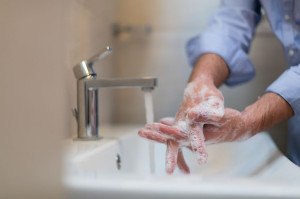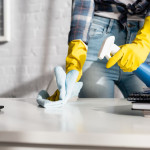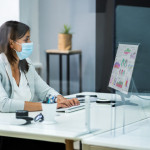 Washing your hands after using the bathroom is a necessary practice. Yet approximately 7% of women and 15% of men skip washing their hands after using the restroom, which can spread germs and bacteria throughout restrooms. If they do wash their hands, they might not do it properly, which also spreads germs and bacteria. Most people only wash their hands for 6 seconds, which is not long enough. Even worse, around 33% of people do not use soap when washing their hands.
Washing your hands after using the bathroom is a necessary practice. Yet approximately 7% of women and 15% of men skip washing their hands after using the restroom, which can spread germs and bacteria throughout restrooms. If they do wash their hands, they might not do it properly, which also spreads germs and bacteria. Most people only wash their hands for 6 seconds, which is not long enough. Even worse, around 33% of people do not use soap when washing their hands.
Many building operators struggle with this dilemma. After all, a person comes into contact with 300 surfaces every 30 minutes, which can expose them to 840,000 germs! So if people aren’t washing their hands as well as they should, all of that exposure collects in their building’s restrooms, which increases the need for cleaning and disinfecting, costing businesses time and money. So, to help encourage better handwashing, building operators are focusing on something new: the type of soap they provide.
Soap is a crucial ingredient for effective handwashing, but it turns out that not all soaps work as well as others. Recently, operators have begun using foam soap instead of gel-based soaps. Unlike gel-based soaps, foam does a better job of helping people wash their hands more effectively. It does not require as much water to foam up to cover the hands, and it’s easier to dispense without as much mess.
Unfortunately, the upfront cost of foam soap and automatic dispensers may be off-putting to many building operators, so it’s essential to think long-term. With foam soap dispensers in your building restrooms, you will be able to encourage better handwashing, reducing the cleanup for gel-based soaps that harden and stick to surfaces, and you will hopefully reduce the transmission of germs and bacteria on restroom surfaces because people will be washing their hands better! It’s a long-term solution that makes your restrooms easier to clean and helps everyone stay healthier.
Another tool that can help keep your restrooms cleaner, even if patrons aren’t washing their hands well, is the Microshield360 system. With this antimicrobial coating, germs and bacteria that land on surfaces from ditty hands are automatically neutralized, which stops their spread. This invisible coating is applied using electrostatic technology to ensure even distribution, lasting up to one year. Restrooms treated with this germ-killing layer are easier to clean because there is 24/7 protection right on the surface. So, if you’re worried about the cleanliness of your restrooms, especially if proper handwashing isn’t being followed, book a Microshield360 treatment today.








